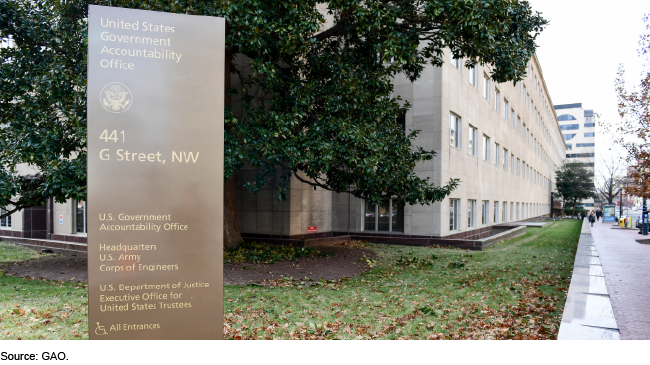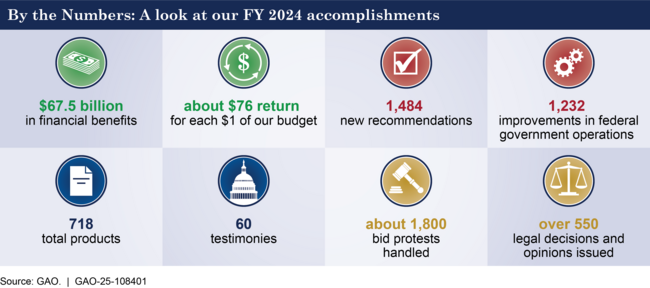Fiscal Year 2026 Budget Request: U.S. Government Accountability Office
Fast Facts
In fiscal year 2024, GAO's work yielded $67.5 billion in financial benefits, a return of about $76 for every dollar invested in GAO. Our average return on investment for the past 6 years is $123 to $1.
In this testimony before the House Subcommittee on Legislative Branch Appropriations, U.S. Comptroller General Gene L. Dodaro discusses GAO's FY 2026 budget request.
Our budget request will enable GAO to continue to meet key areas of importance including national security, science and technology fraud prevention, cybersecurity, and health care costs. These resources will also support GAO's IT modernization and physical space optimization efforts.

Highlights
In fiscal year 2024, GAO's work yielded over $67.5 billion in financial benefits. Our average return on investment for the past 6 years is $123 for every dollar invested in GAO. In fiscal year 2024, GAO also identified 1,232 programmatic and operational benefits that led to improved services to the American people, strengthened public safety, and spurred improvements across government. Congress routinely uses GAO's work to inform key legislative decisions. For example, based on GAO recommendations, Congress:
- directed DOD to establish minimum standards for military housing to address poor conditions;
- required the FAA to develop a strategy to safely integrate drones into the national airspace; and
- directed the National Nuclear Security Administration to improve cybersecurity practices.

GAO's fiscal year 2026 request reflects continued high demand for GAO services. Over the past 4 years, GAO has received, on average, 627 new congressional requests for studies each year, which includes requests from committee leadership and mandates (provisions in legislation and related reports). For example, the latest National Defense Authorization Act and related reports included 95 mandates for GAO; the Water Resources Development Act of 2024 included 26 mandates; and the Federal Aviation Administration Reauthorization Act of 2024 included 36 mandates. In addition to conducting work for new mandates, GAO has over 150 mandates that have recurring reporting requirements. For example, GAO performs annual financial audits of the SEC, FDIC, and IRS, among others. GAO also provides an increasing amount of technical assistance to Members and committees. In fiscal year 2024, GAO provided over 1,100 instances of this informal, quick-turnaround assistance.
GAO's fiscal year 2026 budget request is for $933.9 million in appropriated funds and $72.2 million in offsetting receipts. GAO's workforce is projected to shrink by 126 employees in fiscal year 2025 due to the full-year continuing resolution. The fiscal year 2026 budget request would allow GAO to build back some, but not all, of this loss. These resources will enable GAO to meet the priority needs of the Congress, including five key areas of importance to the nation and Congress:
- National Security Enterprise. GAO evaluates an array of national security efforts in areas such as military readiness, major weapons systems acquisitions, space programs, and the U.S. nuclear complex. The size and complexity of these efforts continue to grow; the fiscal year 2025 continuing resolution increased defense spending by $6 billion over fiscal year 2024 enacted levels.
- Science and Technology. There is growing demand for GAO's science and technology work. GAO has focused on enhancing this area to meet increased demands from Congress. GAO's science and technology team, for example, provided over 90 technical consultations to Congress in 2024 alone. GAO's portfolio of ongoing and future work includes many aspects of artificial intelligence, medical research and applications, critical minerals recovery, and quantum computing.
- Fraud Prevention. GAO examines government efforts to safeguard programs from fraud by focusing agencies more on prevention. In 2024, GAO estimated the federal government lost between $233 billion and $521 billion annually between fiscal years 2018-2022. Similarly, GAO reported that agencies estimated $162 billion in improper payments in 2024, but this does not represent the full extent of this problem.
- Cybersecurity. GAO assesses the development and execution of a comprehensive national cybersecurity strategy, the cybersecurity of 16 critical infrastructure sectors across the U.S., and the security of federal information systems.
- Health Care Costs. GAO examines the sustainability and integrity of the Medicare and Medicaid programs, Veterans Affairs, DOD, and Indian Health Service health care services.
The fiscal year 2026 budget request will also allow GAO to address internal operational needs as well as critical projects and initiatives deferred in fiscal year 2025. Specifically, GAO will advance ongoing IT modernization, cloud management, and storage solutions initiatives while also enhancing internal cyber security controls. Additionally, GAO will continue space optimization projects at both our headquarters building and field offices to increase leasable space and address critical building infrastructure enhancements to improve safety, strengthen reliability, and reduce costs.
Background
GAO's mission is to support Congress in meeting its constitutional responsibilities and to help improve the performance and ensure the accountability of the federal government for the benefit of the American people. GAO's work spans the full breadth and scope of the federal government's responsibilities.
Congress relies on GAO's nonpartisan, objective, and high-quality work to help inform congressional deliberations as well as oversight of the executive branch. GAO routinely conducts work for the Chairs or Ranking Members of over 90 percent of all standing committees.
Since fiscal year 2002, GAO's work has resulted in over:
- $1.45 trillion dollars in financial benefits; and
- Over 29,000 program and operational benefits that helped to change laws, improve public safety, and promote sound management throughout government.
For more information, contact A. Nicole Clowers at CongRel@gao.gov.
